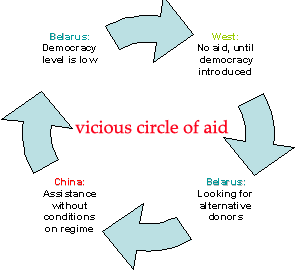Towards an Effective EU Lobby Inside the Belarusian Regime

A. Lukashenka and H. Van Rompuy
Last week Belarusian President Alexander Lukashenka visited Tajikistan where he claimed that Belarus should not be blamed for the current difficulties in Belarus-EU and Belarus-USA relations and that his country 'sincerely tries to establish a constructive interaction'. This is yet another statement which demonstrates that Alexander Lukashenka is interested in Belarus-EU dialogue and hopes to restore the status quo of 18 December 2010. But he is not ready to make political concessions.
This time the European Union is showing remarkable determination to improve bilateral relations only after Belarus releases and rehabilitates all political prisoners. However, does this firm determination help the European Union to achieve its aims in Belarus? So far the EU policy of isolation towards Belarus has failed to achieve its goals. It should be replaced by a new engagement policy based on mutual interests, development of social ties and the creation of lobby groups within the Belarusian regime.
After the establishment of the authoritarian regime in Belarus, between 1995 and 2008 the European Union adhered to a policy of isolation. This was subsequently replaced by an engagement policy following the war in South Ossetia and the creation of the Eastern Partnership. The brutal suppression of the 19 December 2010 opposition demonstration that took place in Minsk after the presidential election forced the European Union to return to the policy of sanctions.
If one is to judge, none of the EU strategic policies towards Belarus produced the results that had been expected. One of the main factors that could have caused the failure of these policies was the lack of information about the real mechanisms of the Belarusian regime. Most Western decision-makers know little about the regime's functioning, decision-making procedures, interest groups and the hidden discussions that take place among them about the future of the country.
Why does the EU needs its own lobby inside the Belarusian regime?
The Belarusian state apparatus functions as a closed corporation to which access, as a rule, is given only to those who are loyal to the ruling elite. If European politicians want their information to be heard by the Belarusian ruler without distortions, the EU should have its own interest groups within the Belarusian regime. In any personalistic regime, “access to the ruling body” is of crucial importance, because only a limited amount of information is available to the leader. It is particularly important in a context where there is not much else left for him to make decisions in the conditions of distorted and insufficient information.
The EU needs its own lobby 'inside' the Belarusian regime to get the up-to-date information about the tendencies and plans of the Belarusian regime as well as its concerns concealed from outsiders.
Social ties between the Belarusian high-ranking officials and their counterparts in the West are very weak. This is why the exchange of experience and information often becomes impossible. However, the exchange of information on a consistent basis could prevent serious crises in relations such as the one which started on 19 December 2010. It is worth noting that one of the first actions taken by USA and USSR leaders after the Cuban Missile Crisis was the establishment of a dedicated telephone line between Khruschev and Kennedy for direct talks in case of emergency.
When the EU does not provide easily available opportunities for youth education and does not want to liberalise the visa regime, it loses future advocates of the European policy in Belarus. Today a significant proportion of young Belarusian state officials are graduates not of European but of Russian universities such as MGIMO, Moscow State University, Russian military academies and FSB Security Service Academy.
The education of the Chief of the Belarusian Presidential Administration Vladimir Makey in the Diplomatic Academy of the Austrian MFA may seem like a minor episode in his biography. However Makey is regarded as the most active adherent to the soft-line policy of the Belarusian regime towards the West in 2008-2010.
Belarus in the regional context
In this context the German-Belarusian Society’s decision to cancel the 2011 Minsk Forum for the first time in 13 years raises doubts about its efficiency. Rainer Lindner, the Society’s Chairman, declared that the reason for the cancellation was the political situation in Belarus after the presidential elections. However, in November of 2009 the Minsk Forum made possible a dialogue between Vladimir Makey and Alexander Milinkevich, one of the opposition leaders. By this cancellation, organisers deprived Belarus of an important dialogue platform for further democratisation.
Official Minsk does not aspire to join the European Union. In contrast to Ukraine it does not hope to get such 'carrots' as signing the Association Agreement and creating a 'deep and comprehensive free trade area' with the EU in the foreseeable future. Moreover, regional experience shows that even with the full opportunity to participate in the European Neighbourhood Policy and the Eastern Partnership, Georgia, Moldova, Ukraine, Azerbaijan and Armenia did not achieve any serious progress in terms of democracy and rule of law. On the contrary, Georgian police suppressed some large opposition manifestations and Ukraine's former Prime Minister Yulia Timoshenko, the main political opponent of the incumbent president Victor Yanukovich, was sentenced to seven years in prison.
Policy recommendations
Therefore, when the EU pursues its isolation policy, it reduces its opportunities to influence the decision-making process in Belarus and to promote political changes in this country. The loyalty of Belarus to European recommendations and policies is very low and to increase it the European Union should elaborate and pursue a new engagement policy, including the establishment of contacts with Belarusian officials and businessmen.
George Plaschinsky
George Plaschinsky is an associate analyst at the Centre for European Transformation in Minsk. He is a graduate of the Moscow State Institute of International Relations (MGIMO University).




